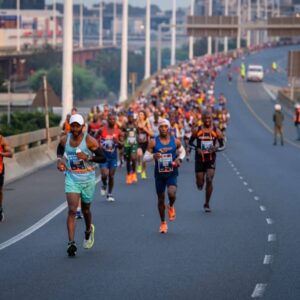In August 2021, The Sanlam Cape Town Marathon was officially confirmed as a potential candidate for the Abbott World Marathon Majors (AbbottWMM) series. It became the first marathon in Africa to be nominated. The race failed to qualify. This year, with entries already at a quarter of the way to reaching the goal of 20,000, the dream of becoming Africa’s first Major might just come true.
The Abbott World Marathon Majors is a series consisting of six of the largest and most renowned marathons in the world. While it is the East Africans, specifically, Kenyans and Ethiopians who have continued to dominate these races, none of the six are held on African soil.
It is no sheer fluke that South Africa and not Kenya stand a high chance of joining the Abbott WMM series.
South Africa’s Leisure Economy
Unlike Kenya and Ethiopia, South Africa has a serious leisure economy.
A combination of favourable natural conditions, a burgeoning fitness culture, well-organized events, community support, and elite athlete inspiration has propelled South Africa to the forefront of recreational running in Africa.
Between 2011 and 2016, South Africa witnessed a threefold increase in the number of official trail running events thanks to a health-conscious mindset that has been growing rapidly.
Witnessed by their embrace of sports watches, reward-based programmes, and participation in organised leisure activities such as cycling and running, trail running has become increasingly popular among the country’s burgeoning middle class.
This, according to a 2020 research report titled Trail Running: Exploring South Africa’s Serious Leisure Economy is because of the country’s historical love affair with ultra-long-distance road running, and with health and physical activity becoming increasingly important. In line with international trends, concerns regarding health, wellness and fitness are common among South Africa’s growing middle class.

Race participants at the 2022 Cape Town Marathon
The research paper further notes that the proliferation of new trail-running events in recent years has been because many of these are destination events where a key aspect of the appeal is running a race within, or at, a specific destination (such as a well-known nature reserve).
“Destination trail-running events, therefore, lie at the intersection of the sport, leisure and tourism industries,” note Lynsey McEwan, Tracey McKay and Melissa Baker the report authors.
The rise as Africa’s recreational running powerhouse can also be attributed to several factors:
Historical Influence: South Africa has a long history of sporting excellence, dating back to the apartheid era when international sporting sanctions isolated the country. Despite this, South African athletes continued to excel domestically, and post-apartheid, they gained access to international competitions, which further fueled their development.
Natural Environment: South Africa boasts diverse and scenic landscapes, from rugged mountains to coastal plains, providing ideal terrain for running events. The country’s pleasant climate also encourages outdoor activities year-round.
Culture of Fitness: There’s a growing culture of fitness and wellness in South Africa, spurred by increasing awareness of the importance of a healthy lifestyle. Recreational running has become a popular activity for people of all ages and backgrounds.
Event Organization: South Africa hosts numerous well-organized running events throughout the year, ranging from fun runs to marathons and ultra-marathons. Events like the Cape Town Marathon, Comrades Marathon, Two Oceans Marathon, and park runs attract thousands of participants locally and internationally.
Social Connectivity: The running community in South Africa is vibrant and inclusive, with clubs, groups, and online communities providing support, encouragement, and camaraderie. This sense of belonging and shared passion for running motivates individuals to participate and excel.
Elite Athlete Inspiration: South Africa has produced world-class distance runners like Bruce Fordyce, Zola Budd, and more recently, athletes like Stephen Mokoka and Gerda Steyn. Their achievements inspire aspiring runners and contribute to the overall popularity of the sport.
Investment in Facilities: There has been investment in infrastructure, including running tracks, trails, and parks, to support recreational running. Cities like Cape Town and Johannesburg have designated running routes and green spaces that cater to runners of all levels.
Tourism: Major running events in South Africa, such as the Comrades Marathon and Two Oceans Marathon, attract international participants and spectators, boosting tourism and the country’s reputation as a running destination.
With just four months to go, the Sanlam Cape Town Marathon slated for 19-20 October needs 20,000 entries to pass phase one of their candidacy Criteria in 2024 to bring Africa her first world Major marathon event. Achieving this audacious goal will be a crown jewel for the country’s recreational running community & leisure economy.